Newly inaugurated Taiwanese President William Lai has issued a bold call to China, urging the nation to cease its threats and acknowledge Taiwan’s democratic existence.
In his inaugural address, Lai emphasized Taiwan’s unwavering commitment to democracy and its refusal to yield to Chinese intimidation. He extended an olive branch, proposing dialogue and cooperation, but Beijing swiftly rebuffed his overture, reiterating its stance that Taiwanese independence is a “dead end.”
Lai’s presidency marks a new chapter in Taiwan’s complex relationship with China, which has intensified military incursions and diplomatic pressure in recent years.

Despite China’s disapproval, Lai has reaffirmed his commitment to maintaining the status quo, preserving Taiwan’s sovereignty while avoiding provocative actions that might escalate tensions.
His approach aligns with that of his predecessor, President Tsai Ing-wen, who navigated the delicate balance between asserting Taiwan’s autonomy and avoiding confrontation with China.
Lai’s inauguration has sparked both hope and trepidation, as Taiwan’s allies and adversaries alike watch closely for signs of how his leadership will shape the island’s future.
With a divided parliament and pressing domestic challenges, including unemployment and economic dependence on the semiconductor industry, Lai faces a daunting task in balancing Taiwan’s internal needs with its external relations.
As the world watches, Taiwan’s new president must navigate the treacherous waters of cross-strait relations, seeking a path that ensures peace, stability, and the preservation of Taiwan’s hard-won democracy.

